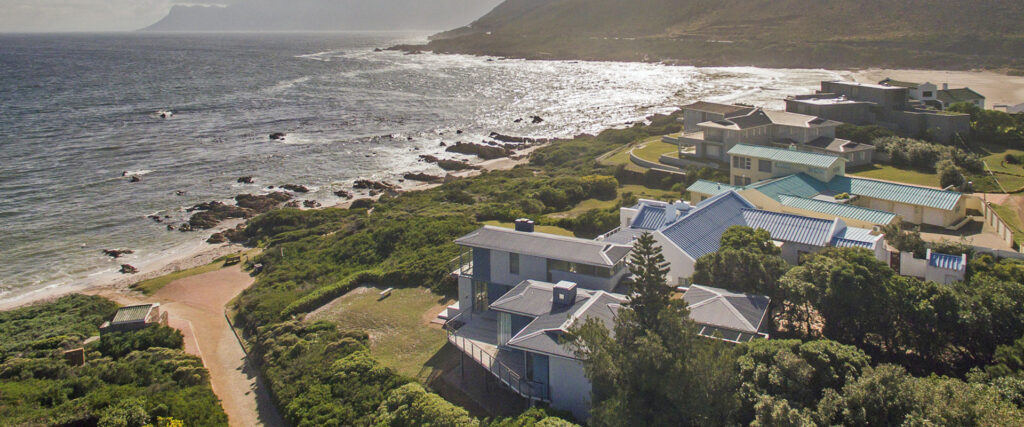MAIN IMAGE: Aerial view of Rooiels, one of the coastal towns near Cape Town
The end of 2020 saw an almost 50% increase in the number of people investing in an additional property, primarily for rental or holiday purposes.
FNB has revealed that they’ve seen a 46% increase in the total number of buyers who purchased their secondary properties in the fourth quarter of 2020 compared to the fourth quarter of 2019.
A considerable amount of the property purchases was made in lower priced rental properties, with 20.6% of the purchases made for properties priced at less than R500 000 and 24% for properties priced between R500k and R1 million.
FNB Private Bank Lending Chief Executive, Praven Subbramoney says, “This data mirrors the trend currently seen in the broader property market regarding the increase in secondary property buying in the more affordable segments driven by middle- and high-income earners who are taking advantage of low borrowing costs and well-priced properties. In addition to low interest rates, the increased demand can be attributed to the savings customers made from not paying student accommodation during the lockdown period and the trading down in this market due to decreased demand.
Subbramoney explains that clients purchase additional properties for various reasons, primarily for rental and holiday purposes. For rental property purchases, the purchaser typically looks at properties that fit within their financial management journey and wealth creation aspirations. Having said that, student accommodation purchases as well as sectional title properties are in demand due to their lock-up and go nature and lower maintenance costs.
He notes that what has also become prevalent is the upward trajectory in investing in this type of property due to the energy and water saving solutions which put money in the investors’ pocket. “Coastal properties are also preferred for people looking for holiday homes and with the advent of Airbnb, it has made it easier for these individuals to also earn rental income on their holiday homes,” he adds.
Women continue to dominate home buying market
Of those who bought secondary properties in 2020 and grew their property balance sheets, 52% were male, and 48% were female. With this said, the broader home buying picture, still depicts that women dominate the home buying market by a remarkable 53%, especially in the first-time home buyers’ market.
From a regional point of view, 34% of secondary properties were purchased in Gauteng, 22% in the Western Cape and 9% in the KZN, mirroring the economical and job activity in these leading provinces.
“Property represents a stable investment which will grow over time and serve as a wealth creation tool for you and your family for future generations to come. If you are looking to enter the property market for a secondary property, remember that property is a long-term investment which comes with monthly costs. Before making the commitment, it is always worthwhile to consult experts who will be able to assist you in the process of turning your property into an investment and advise you on a strategy that will positively impact the growth of your portfolio,” concludes Subbramoney.
Slowing down expected for the rest of 2021
Halfway into 2021, FNB’s data shows continued strong demand for housing especially in the low to medium price range. Their survey of estate agents also indicates possible stock shortages as sellers withdraw properties from the market or are reluctant to put their properties up for sale. However, FNB senior economist Siphamandla Mkhwanazi, says in the months ahead he expects activity and eventually house price growth to slow down eventually. Encouraged by the low interest rates, much of the home buying activity seen over the last couple of months have been fuelled by the demand for bigger living spaces to facilitate remote work. Many former tenants have also switched from rental to homeownership. However, Mkhwanazi says he expects that it is unlikely that there is much of this demand left in the tank. “Stats SA data shows that 66 000 professionals lost their jobs in Q42020, which does not augur well for mortgage demand,” he says.
The rental market is expected to remain under pressure as vacancy rates keep climbing. Anecdotal evidence indicates some of these properties are being put up for sale.
Not surprisingly, downgrading due to financial pressure accounts for 21% of sales in 1Q21 (compared to 15.9% in 2019) but isn’t getting worse reckons Mkhwanazi. Estate agents surveyed report fewer people are citing emigration as a reason for selling (10% 1Q21 compared to 14.2% in 2019). Upgrading to accommodate home schooling and remote working demands continues to be a strong trend (16% of transactions in 1Q21, up from 13% in 4Q20).
“The level of activity we are experiencing is unexpected and nobody knows how long this boom will last. I do, however, expect that hard times are ahead as many industries continue to be affected by the various lockdown restrictions. Though I cannot predict how things will unfold during these uncertain times, I do believe it to be unlikely that the market will continue to be this active for very much longer. Buyers, sellers, landlords and tenants who are hoping to change their living situations over this time should establish a working relationship with a knowledgeable real estate professional who can keep them up-to-date with the local market conditions as things change,” comments regional director and CEO of RE/MAX of Southern Africa, Adrian Goslett.








